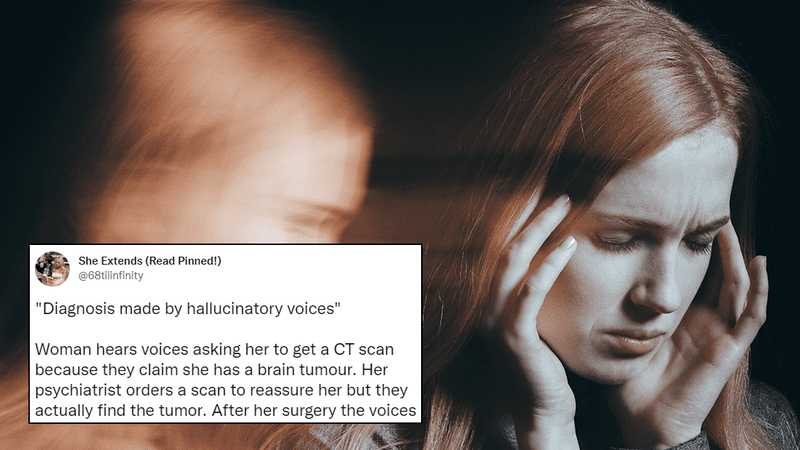An unusual medical case report has gone viral over the last few days, which is somewhat unusual in itself. But the genuine case report more than warrants the attention being paid to it, as it's a wild ride involving a woman's hallucinated voices apparently diagnosing her brain tumor.
The case report, published in the BMJ, tells the story of one patient – a woman in her early 40s – who said she was at home alone and reading one day, when a voice began to talk to her.
“Please don’t be afraid. I know it must be shocking for you to hear me speaking to you like this, but this is the easiest way I could think of," the voice told her, according to the report.
"My friend and I used to work at the Children’s Hospital, Great Ormond Street, and we would like to help you.”
The patient, who was previously perfectly healthy, sought psychiatric help, meeting the author of the report, Dr Ikechukwu Obialo Azuonye. After a diagnosis of functional hallucinatory psychosis, she was given medication and counseling, and for a time the hallucinations went away.
But then, when she was on holiday abroad, they returned.
"They told her that they wanted her to return to England immediately as there was something wrong with her for which she should have immediate treatment," Azuonye explained.
This time, the voices had given her an address. You should probably note at this point that there are plenty of ways that she could have gotten the address if she had wanted to, and she was having other beliefs of a delusional nature at the time too. However, when her husband took her to the address, "it was the computerised tomography (CT) department of a large London hospital".
The voices then informed her she had a brain tumor and her brain stem was inflamed, and that she should go inside and ask for a scan. When she saw the psychiatrist the following day, she was in such distress that he ordered her a brain scan (with some negotiation, as there were no real medical signs that she had this tumor or inflammation) in order to reassure her that she didn't. But she did.
"The initial findings led to a repeat scan, with enhancement, in May, revealing a left posterior frontal parafalcine mass, which extended through the falx to the right side," the doctor wrote. "It had all the appearances of a meningioma."
The patient and team discussed how best to deal with the tumor, and decided to operate early, a decision which the hallucinated voices agreed with. The tumor was removed, but when she woke up following the operation she heard the voice again, telling her "we are pleased to have helped you. Goodbye.”
According to the doctor, who followed up with her 12 years later, the voices did not return again.
"It is well known that intracranial lesions can be associated with psychiatric symptomatology," Azuonye wrote, about to claim an incredible world first.
"But this is the first and only instance I have come across in which hallucinatory voices sought to reassure the patient of their genuine interest in her welfare, offered her a specific diagnosis (there were no clinical signs that would have alerted anyone to the tumour), directed her to the type of hospital best equipped to deal with her problem, expressed pleasure that she had at last received the treatment they desired for her, bid her farewell, and thereafter disappeared."
Now for a rational explanation. When Azuonye presented the case at a conference, his colleagues suggested a number of possibilities.
One was that she had been diagnosed with a brain tumor elsewhere, and was faking the hallucinations in order to get treatment for free under the National Health Service (NHS) of the UK. However, this is unlikely as she was already entitled to NHS treatment, having lived in the UK for 15 years.
Another was that she had felt the tumor, or a funny feeling or pain in her head, making her fear that she had a tumor and prompting this hallucination. As for her trip to the hospital, they argued that she could have unconsciously taken in more information than she realized about hospitals in the area, which was incorporated into the hallucinations.
Either way, it may well be the only case of someone whose brain tumor helped diagnose their brain tumor.
The case study is published in the BMJ.




